外研版高中英语必修三Module 3The Violence of Nature grammar完成时被动语态课件(共40张)
文档属性
| 名称 | 外研版高中英语必修三Module 3The Violence of Nature grammar完成时被动语态课件(共40张) | 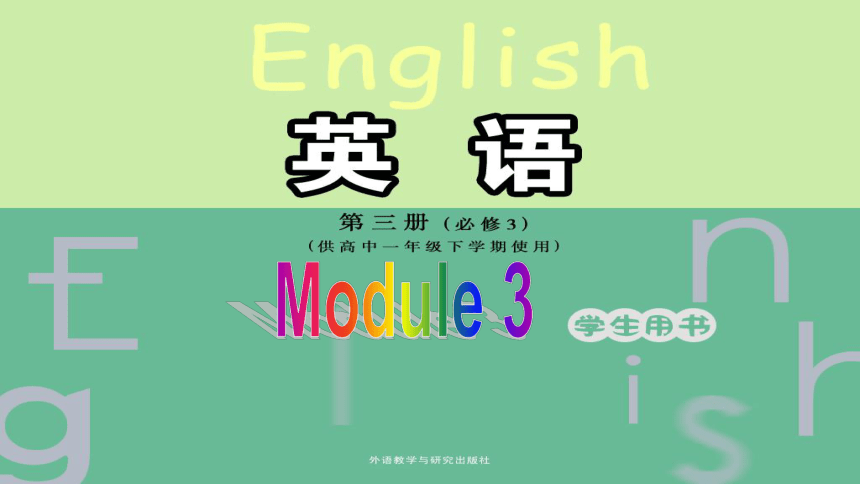 | |
| 格式 | zip | ||
| 文件大小 | 578.6KB | ||
| 资源类型 | 教案 | ||
| 版本资源 | 外研版 | ||
| 科目 | 英语 | ||
| 更新时间 | 2019-04-16 17:05:59 | ||
图片预览

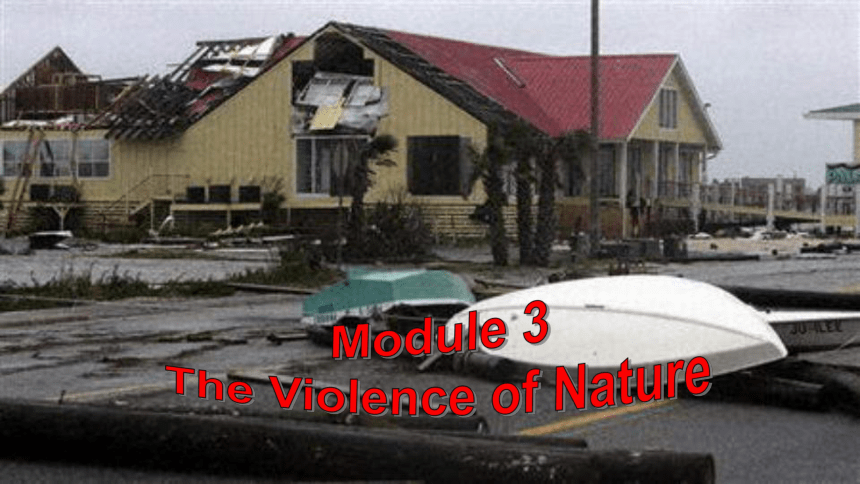

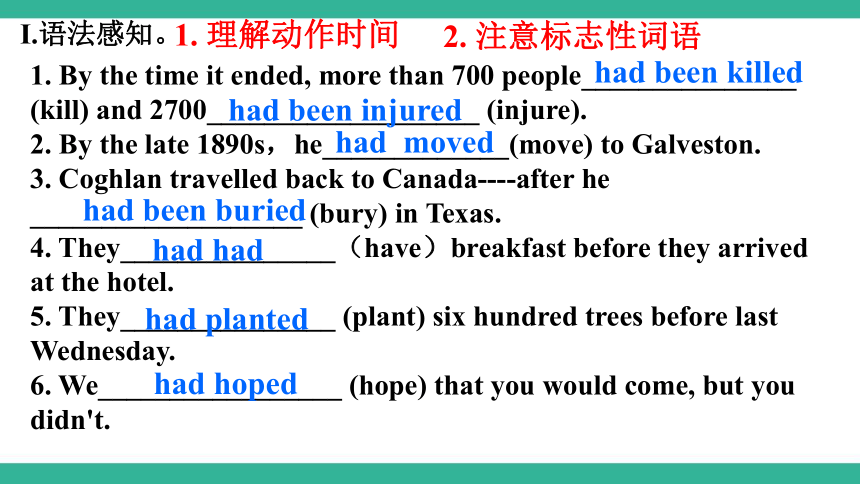
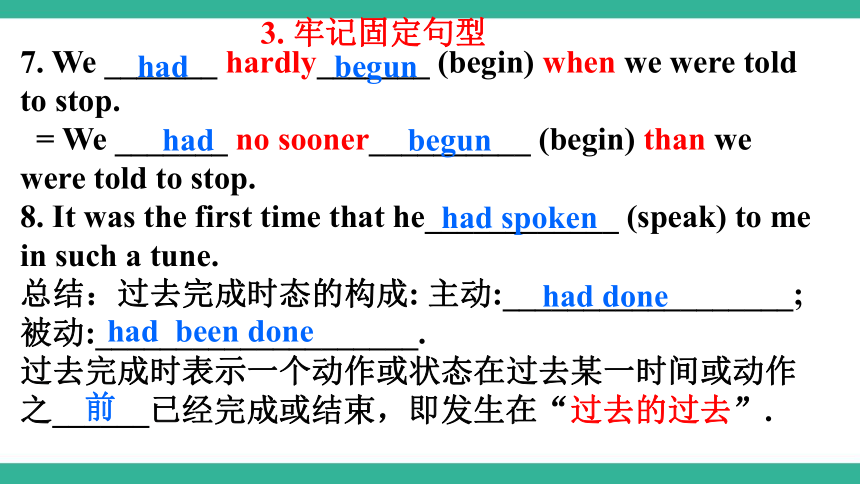
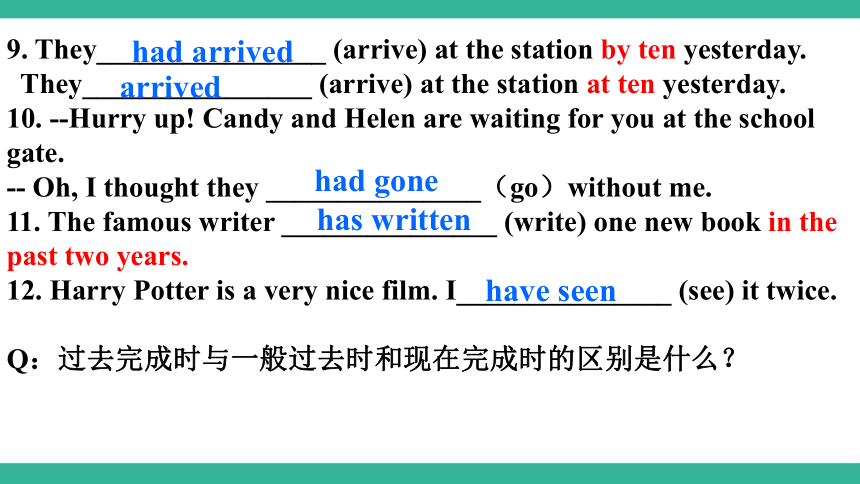
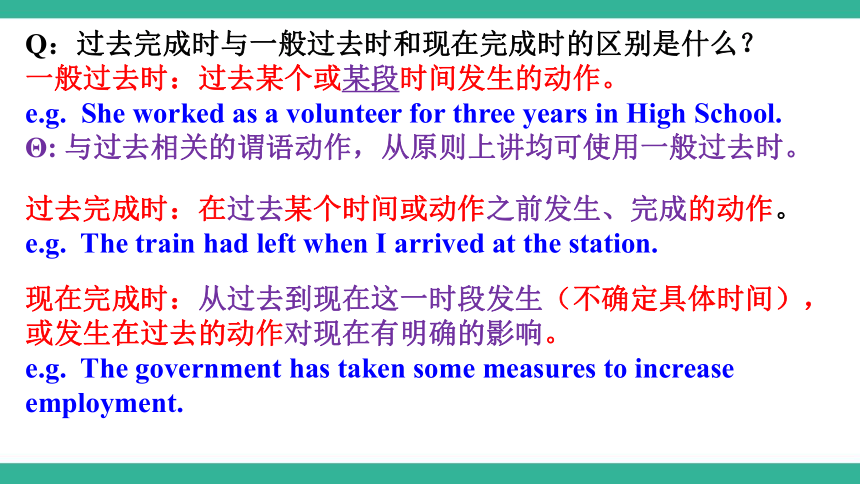
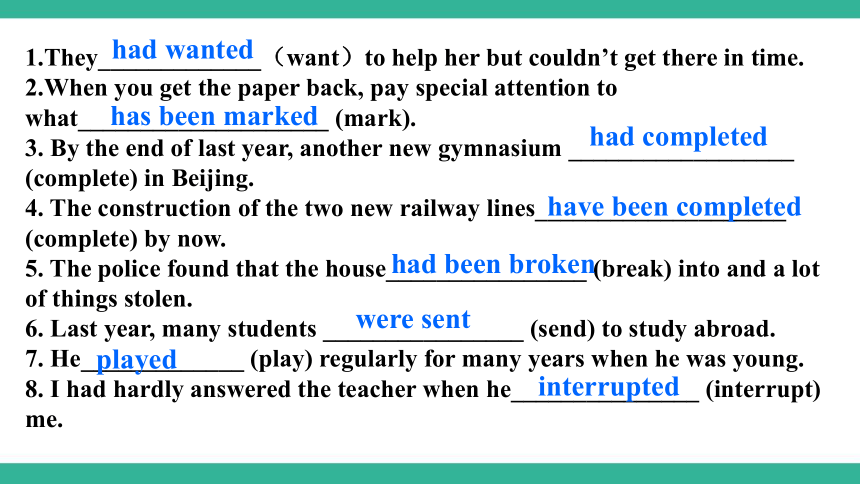
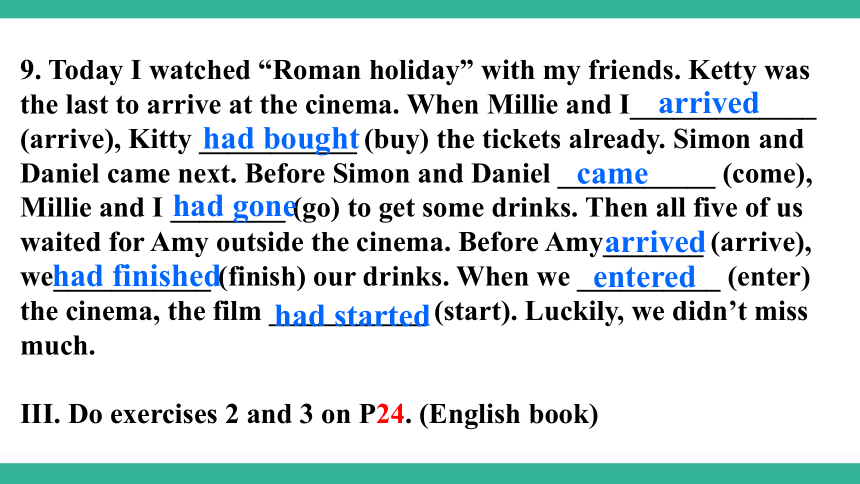
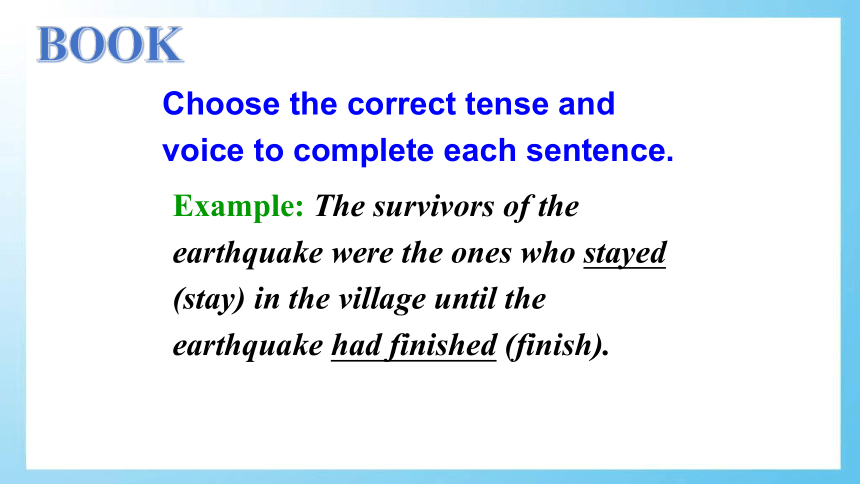
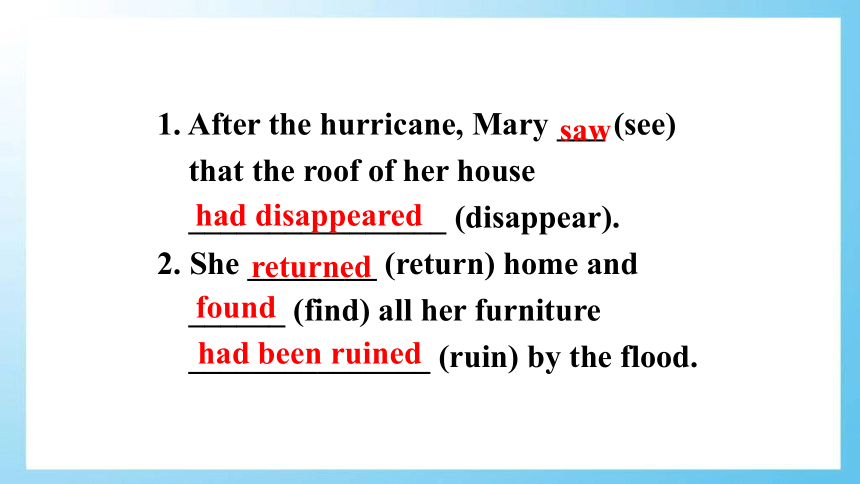
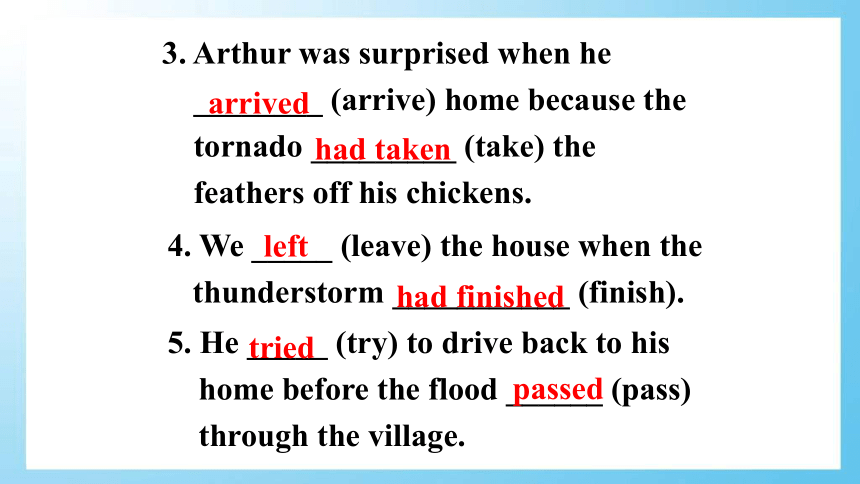
文档简介
课件40张PPT。Module 3Module 3
The Violence of NatureThe past perfect passive
过去完成时被动语态1. By the time it ended, more than 700 people_______________ (kill) and 2700___________________ (injure).
2. By the late 1890s,he_____________(move) to Galveston.
3. Coghlan travelled back to Canada----after he ___________________ (bury) in Texas.
4. They_______________(have)breakfast before they arrived at the hotel.
5. They_______________ (plant) six hundred trees before last Wednesday.
6. We_________________ (hope) that you would come, but you didn't.I.语法感知。had been killedhad been injuredhad movedhad been buriedhad hadhad planted1. 理解动作时间had hoped2. 注意标志性词语7. We _______ hardly_______ (begin) when we were told to stop.
= We _______ no sooner__________ (begin) than we were told to stop.
8. It was the first time that he____________ (speak) to me in such a tune.
总结:过去完成时态的构成: 主动:__________________;被动:____________________.
过去完成时表示一个动作或状态在过去某一时间或动作之______已经完成或结束,即发生在“过去的过去”.had begunhad begunhad spokenhad donehad been done前3. 牢记固定句型9. They________________ (arrive) at the station by ten yesterday.
They________________ (arrive) at the station at ten yesterday.
10. --Hurry up! Candy and Helen are waiting for you at the school gate.
-- Oh, I thought they _______________(go)without me.
11. The famous writer _______________ (write) one new book in the past two years.
12. Harry Potter is a very nice film. I_______________ (see) it twice.
Q:过去完成时与一般过去时和现在完成时的区别是什么?had arrived arrived had gone has written have seenQ:过去完成时与一般过去时和现在完成时的区别是什么?
一般过去时:过去某个或某段时间发生的动作。
e.g. She worked as a volunteer for three years in High School.
Θ: 与过去相关的谓语动作,从原则上讲均可使用一般过去时。
过去完成时:在过去某个时间或动作之前发生、完成的动作。
e.g. The train had left when I arrived at the station.
现在完成时:从过去到现在这一时段发生(不确定具体时间),或发生在过去的动作对现在有明确的影响。
e.g. The government has taken some measures to increase employment. 1.They_____________(want)to help her but couldn’t get there in time.
2.When you get the paper back, pay special attention to what____________________ (mark).
3. By the end of last year, another new gymnasium __________________ (complete) in Beijing.
4. The construction of the two new railway lines____________________ (complete) by now.
5. The police found that the house________________ (break) into and a lot of things stolen.
6. Last year, many students ________________ (send) to study abroad.
7. He_____________ (play) regularly for many years when he was young.
8. I had hardly answered the teacher when he_______________ (interrupt) me.had wantedhas been markedhad completedhave been completedhad been brokenwere sentplayedinterrupted9. Today I watched “Roman holiday” with my friends. Ketty was the last to arrive at the cinema. When Millie and I_____________ (arrive), Kitty ___________ (buy) the tickets already. Simon and Daniel came next. Before Simon and Daniel ___________ (come), Millie and I ________ (go) to get some drinks. Then all five of us waited for Amy outside the cinema. Before Amy_______ (arrive), we___________ (finish) our drinks. When we __________ (enter) the cinema, the film ___________ (start). Luckily, we didn’t miss much.
III. Do exercises 2 and 3 on P24. (English book) arrivedhad boughtcamehad gone arrivedhad finished enteredhad startedChoose the correct tense and voice to complete each sentence.Example: The survivors of the earthquake were the ones who stayed (stay) in the village until the earthquake had finished (finish).BOOK1. After the hurricane, Mary ___ (see) that the roof of her house ________________ (disappear).
2. She ________ (return) home and ______ (find) all her furniture _______________ (ruin) by the flood.sawhad disappearedreturnedfoundhad been ruined3. Arthur was surprised when he ________ (arrive) home because the tornado _________ (take) the feathers off his chickens.arrivedhad taken4. We _____ (leave) the house when the thunderstorm ___________ (finish).lefthad finished5. He _____ (try) to drive back to his home before the flood ______ (pass) through the village.triedpassedComplete these sentences with the verbs from the box. Use the past perfect passive, if necessary.destroy die fall flood kill1. After the earthquake, they discovered
that several people
_______________________.had been killed / had died2. When the hurricane ended, several
buildings in the town ___________
_____________________________.
3. His village _____________________
_____________ in the heavy rain, so
he moved to his parents’ house. had been destroyed / had fallen down had been flooded / had been destroyeddestroy die fall flood kill4. When she woke up, she found that her house ___________________ by the thunderstorm.
5. Arthur was unhappy because some of his animals _____________________ _______.had been destroyed had died / had been killeddestroy die fall flood kill直接引语: 直接引用别人的话, 把它放在引号内。(direct speech)
间接引语: 用自己的话转述别人的话。
(indirect speech)21. a. David said, “I want to buy the jacket in this shop.”
→David said?(that) he wanted?to buy the jacket in?that?shop.
b. “The students are taking a listening test now,” the teacher said.
→The teacher said?(that)?the students?were taking?a listening test?then.观察句子,试着归纳直接引语变间接引语的规律。 c. Helen said, “I’ve returned from Paris.”
→Helen said?(that) she had returned?from Paris.
d. “I had just moved here a week before,” she said.
→She said?(that) she had?just?moved there?a week before.直接引语是陈述句,变为间接引语时,在多数情况下都构成一个由that引导的宾语从句(that在口语中常省略)。 2. a. Tom said, “Can you type, Mary?”
→Tom?asked?Mary?if / whether she could?type.
b. “Do you think a diary can become your friend?” the writer says to us.
→The writer?asks?us?if? / whether we?think a diary can become our?
friend.直接引语是一般疑问句,变为间接引语时,常将它变成由___________引导的宾语从句。if / whether2. a. Tom said, “Can you type, Mary?”
→Tom?asked?Mary?if / whether she could?type.
b. “Do you think a diary can become your friend?” the writer says to us.
→The writer?asks?us?if? / whether we?think a diary can become our?
friend.主句谓语动词是say或said时,
要改为_____或______。 ask asked3. a. “When will the manager come back from Paris?” she asked me.
→She asked me?when?the manager?would come back?from Paris.
b. “Who told you about the job?” Mr. Smith asked me.
→Mr. Smith asked me?who had told me?about the job.直接引语是特殊疑问句,变为间接引语时,将它变成由原来的疑问词引导的宾语从句。 4. a. He said to Ann, “Tell me your problem.”
→He?told?Ann to tell?him her?problem.
b. David said to me, “Leave the room quietly.”
→David?ordered?me to leave the room quietly.直接引语是祈使句,变为间接引语时,通常采用“宾语+不定式”结构。c. “Don’t work in bed, Tom,” she said.
→She?told?Tom?not to?work in bed.如果转述的祈使句为否定式,则在不定式前加not。 直接引语转化间接引语, 引导词总结:直接引语变为间接引语时,如主句的谓语动词是一般过去时,从句的谓语动词在时态方面需要做相应的变化。过去进行时过去完成时 直接引语如果是客观真理,变为间接引语时,时态不变。 “The moon travels round the earth once a month,” the teacher said to the children.
→The teacher told the children?(that)?
the moon?travels?round the earth once a month.【温馨提示】当直接引语中有表示过去的具体的时间状语时, 变为间接引语时, 从句中的谓语时态可以不变。
She said, “I was born in 1995.” →
She said (that) she was born in 1995.
另外, 如果在当地或者当天转述, 时间状语、地点状语、动词需不需要发生变化, 这要由当时的语境来确定。直接引语变为间接引语时人称、指示代
词、时间状语、地点状语和动词直接引语变为间接引语时,人称、指示代词、时间状语、地点状语等要作相应的变化。人称的变化:
遵循一主、二宾、三不变的原则。
即: 直接引语中的第一人称在变成间接引语时, 要和原句中的主语保持一致;直接引语中的第二人称在变成间接引语时,要和原句中的宾语保持一致;
直接引语中的第三人称在变成间接引语时,保持不变。thatthosethenthat day, that nightthat week / month …指示代词/时间状语/地点状语等的变化the day beforeten days … beforethe next day/year…theregotake1. Linda said, “I’m meeting David for
dinner.”
Linda said (that) she ____ ________
David for dinner.was meetingExercisesI. Fill in the blanks according the
sentences.2. Bill said, “I forgot to pay my
electricity bill.”
Bill said (that) he ______ __ to pay
his electricity bill.
3. I asked Jack, “Do you know the
caller’s name?”
I asked Jack _______ __ _____ ____
_______ ______.forgot to whether he knew the
caller’s name 4. The teacher asked him, “Why were you
late yesterday?”
The teacher asked him ____ ___ ____
____ ____ ____ _______.
5. “Don’t make so much noise, boys,” the
teacher said.
The teacher told the boys ___ __ _____
so much noise. why he was late the day beforenot to makeVolcanic eruption don’t happen very often on the island.
A scientist said that ________________
_________________________________
______________.II. Rewrite the sentences using the
reporting expressions. volcanic eruptions didn’t happen very often on the islandII. Do Activity 2 on P26 (English book).2. No one was on the island during the volcanic eruption.
A local journalist said that __________
_________________________________
_________________________________. no one was / had been on the island during the volcanic eruptions3. The thunderstorm will put out the fires. Local people said that _______________
________________________. the thunderstorm would put out the fires4. The residents can go back to their
homes.
The governor said that ____________
_____________________________. the residents could go back to their homes5. Several eruptions have taken place in
the last twenty years.
A local radio station said that ______
_______________________________
_____________________. several eruptions had taken place in the previous twenty years6. The residents will travel back to the
island when the danger is over.
A local journalist said that _______
_______________________________
_______________________________. the residents would travel back to the island when the danger was overIII. Correct the following sentences.
1. She said that she is a dentist.
2. Tom said he will go to New York.
3. My father asked that if I had finished reading that novel.
4. John said he was going to give a lecture next week.
5. He said he has worked out that problem.
6. Mom asked Mary what she was doing this evening.
7. He said that his parents had died ten years ago.
8. Monika asked the teacher if she can turn in handwork the following day.is---waswill---would删除thatnext加thehas---hadthis---thatago---beforecan---could
The Violence of NatureThe past perfect passive
过去完成时被动语态1. By the time it ended, more than 700 people_______________ (kill) and 2700___________________ (injure).
2. By the late 1890s,he_____________(move) to Galveston.
3. Coghlan travelled back to Canada----after he ___________________ (bury) in Texas.
4. They_______________(have)breakfast before they arrived at the hotel.
5. They_______________ (plant) six hundred trees before last Wednesday.
6. We_________________ (hope) that you would come, but you didn't.I.语法感知。had been killedhad been injuredhad movedhad been buriedhad hadhad planted1. 理解动作时间had hoped2. 注意标志性词语7. We _______ hardly_______ (begin) when we were told to stop.
= We _______ no sooner__________ (begin) than we were told to stop.
8. It was the first time that he____________ (speak) to me in such a tune.
总结:过去完成时态的构成: 主动:__________________;被动:____________________.
过去完成时表示一个动作或状态在过去某一时间或动作之______已经完成或结束,即发生在“过去的过去”.had begunhad begunhad spokenhad donehad been done前3. 牢记固定句型9. They________________ (arrive) at the station by ten yesterday.
They________________ (arrive) at the station at ten yesterday.
10. --Hurry up! Candy and Helen are waiting for you at the school gate.
-- Oh, I thought they _______________(go)without me.
11. The famous writer _______________ (write) one new book in the past two years.
12. Harry Potter is a very nice film. I_______________ (see) it twice.
Q:过去完成时与一般过去时和现在完成时的区别是什么?had arrived arrived had gone has written have seenQ:过去完成时与一般过去时和现在完成时的区别是什么?
一般过去时:过去某个或某段时间发生的动作。
e.g. She worked as a volunteer for three years in High School.
Θ: 与过去相关的谓语动作,从原则上讲均可使用一般过去时。
过去完成时:在过去某个时间或动作之前发生、完成的动作。
e.g. The train had left when I arrived at the station.
现在完成时:从过去到现在这一时段发生(不确定具体时间),或发生在过去的动作对现在有明确的影响。
e.g. The government has taken some measures to increase employment. 1.They_____________(want)to help her but couldn’t get there in time.
2.When you get the paper back, pay special attention to what____________________ (mark).
3. By the end of last year, another new gymnasium __________________ (complete) in Beijing.
4. The construction of the two new railway lines____________________ (complete) by now.
5. The police found that the house________________ (break) into and a lot of things stolen.
6. Last year, many students ________________ (send) to study abroad.
7. He_____________ (play) regularly for many years when he was young.
8. I had hardly answered the teacher when he_______________ (interrupt) me.had wantedhas been markedhad completedhave been completedhad been brokenwere sentplayedinterrupted9. Today I watched “Roman holiday” with my friends. Ketty was the last to arrive at the cinema. When Millie and I_____________ (arrive), Kitty ___________ (buy) the tickets already. Simon and Daniel came next. Before Simon and Daniel ___________ (come), Millie and I ________ (go) to get some drinks. Then all five of us waited for Amy outside the cinema. Before Amy_______ (arrive), we___________ (finish) our drinks. When we __________ (enter) the cinema, the film ___________ (start). Luckily, we didn’t miss much.
III. Do exercises 2 and 3 on P24. (English book) arrivedhad boughtcamehad gone arrivedhad finished enteredhad startedChoose the correct tense and voice to complete each sentence.Example: The survivors of the earthquake were the ones who stayed (stay) in the village until the earthquake had finished (finish).BOOK1. After the hurricane, Mary ___ (see) that the roof of her house ________________ (disappear).
2. She ________ (return) home and ______ (find) all her furniture _______________ (ruin) by the flood.sawhad disappearedreturnedfoundhad been ruined3. Arthur was surprised when he ________ (arrive) home because the tornado _________ (take) the feathers off his chickens.arrivedhad taken4. We _____ (leave) the house when the thunderstorm ___________ (finish).lefthad finished5. He _____ (try) to drive back to his home before the flood ______ (pass) through the village.triedpassedComplete these sentences with the verbs from the box. Use the past perfect passive, if necessary.destroy die fall flood kill1. After the earthquake, they discovered
that several people
_______________________.had been killed / had died2. When the hurricane ended, several
buildings in the town ___________
_____________________________.
3. His village _____________________
_____________ in the heavy rain, so
he moved to his parents’ house. had been destroyed / had fallen down had been flooded / had been destroyeddestroy die fall flood kill4. When she woke up, she found that her house ___________________ by the thunderstorm.
5. Arthur was unhappy because some of his animals _____________________ _______.had been destroyed had died / had been killeddestroy die fall flood kill直接引语: 直接引用别人的话, 把它放在引号内。(direct speech)
间接引语: 用自己的话转述别人的话。
(indirect speech)21. a. David said, “I want to buy the jacket in this shop.”
→David said?(that) he wanted?to buy the jacket in?that?shop.
b. “The students are taking a listening test now,” the teacher said.
→The teacher said?(that)?the students?were taking?a listening test?then.观察句子,试着归纳直接引语变间接引语的规律。 c. Helen said, “I’ve returned from Paris.”
→Helen said?(that) she had returned?from Paris.
d. “I had just moved here a week before,” she said.
→She said?(that) she had?just?moved there?a week before.直接引语是陈述句,变为间接引语时,在多数情况下都构成一个由that引导的宾语从句(that在口语中常省略)。 2. a. Tom said, “Can you type, Mary?”
→Tom?asked?Mary?if / whether she could?type.
b. “Do you think a diary can become your friend?” the writer says to us.
→The writer?asks?us?if? / whether we?think a diary can become our?
friend.直接引语是一般疑问句,变为间接引语时,常将它变成由___________引导的宾语从句。if / whether2. a. Tom said, “Can you type, Mary?”
→Tom?asked?Mary?if / whether she could?type.
b. “Do you think a diary can become your friend?” the writer says to us.
→The writer?asks?us?if? / whether we?think a diary can become our?
friend.主句谓语动词是say或said时,
要改为_____或______。 ask asked3. a. “When will the manager come back from Paris?” she asked me.
→She asked me?when?the manager?would come back?from Paris.
b. “Who told you about the job?” Mr. Smith asked me.
→Mr. Smith asked me?who had told me?about the job.直接引语是特殊疑问句,变为间接引语时,将它变成由原来的疑问词引导的宾语从句。 4. a. He said to Ann, “Tell me your problem.”
→He?told?Ann to tell?him her?problem.
b. David said to me, “Leave the room quietly.”
→David?ordered?me to leave the room quietly.直接引语是祈使句,变为间接引语时,通常采用“宾语+不定式”结构。c. “Don’t work in bed, Tom,” she said.
→She?told?Tom?not to?work in bed.如果转述的祈使句为否定式,则在不定式前加not。 直接引语转化间接引语, 引导词总结:直接引语变为间接引语时,如主句的谓语动词是一般过去时,从句的谓语动词在时态方面需要做相应的变化。过去进行时过去完成时 直接引语如果是客观真理,变为间接引语时,时态不变。 “The moon travels round the earth once a month,” the teacher said to the children.
→The teacher told the children?(that)?
the moon?travels?round the earth once a month.【温馨提示】当直接引语中有表示过去的具体的时间状语时, 变为间接引语时, 从句中的谓语时态可以不变。
She said, “I was born in 1995.” →
She said (that) she was born in 1995.
另外, 如果在当地或者当天转述, 时间状语、地点状语、动词需不需要发生变化, 这要由当时的语境来确定。直接引语变为间接引语时人称、指示代
词、时间状语、地点状语和动词直接引语变为间接引语时,人称、指示代词、时间状语、地点状语等要作相应的变化。人称的变化:
遵循一主、二宾、三不变的原则。
即: 直接引语中的第一人称在变成间接引语时, 要和原句中的主语保持一致;直接引语中的第二人称在变成间接引语时,要和原句中的宾语保持一致;
直接引语中的第三人称在变成间接引语时,保持不变。thatthosethenthat day, that nightthat week / month …指示代词/时间状语/地点状语等的变化the day beforeten days … beforethe next day/year…theregotake1. Linda said, “I’m meeting David for
dinner.”
Linda said (that) she ____ ________
David for dinner.was meetingExercisesI. Fill in the blanks according the
sentences.2. Bill said, “I forgot to pay my
electricity bill.”
Bill said (that) he ______ __ to pay
his electricity bill.
3. I asked Jack, “Do you know the
caller’s name?”
I asked Jack _______ __ _____ ____
_______ ______.forgot to whether he knew the
caller’s name 4. The teacher asked him, “Why were you
late yesterday?”
The teacher asked him ____ ___ ____
____ ____ ____ _______.
5. “Don’t make so much noise, boys,” the
teacher said.
The teacher told the boys ___ __ _____
so much noise. why he was late the day beforenot to makeVolcanic eruption don’t happen very often on the island.
A scientist said that ________________
_________________________________
______________.II. Rewrite the sentences using the
reporting expressions. volcanic eruptions didn’t happen very often on the islandII. Do Activity 2 on P26 (English book).2. No one was on the island during the volcanic eruption.
A local journalist said that __________
_________________________________
_________________________________. no one was / had been on the island during the volcanic eruptions3. The thunderstorm will put out the fires. Local people said that _______________
________________________. the thunderstorm would put out the fires4. The residents can go back to their
homes.
The governor said that ____________
_____________________________. the residents could go back to their homes5. Several eruptions have taken place in
the last twenty years.
A local radio station said that ______
_______________________________
_____________________. several eruptions had taken place in the previous twenty years6. The residents will travel back to the
island when the danger is over.
A local journalist said that _______
_______________________________
_______________________________. the residents would travel back to the island when the danger was overIII. Correct the following sentences.
1. She said that she is a dentist.
2. Tom said he will go to New York.
3. My father asked that if I had finished reading that novel.
4. John said he was going to give a lecture next week.
5. He said he has worked out that problem.
6. Mom asked Mary what she was doing this evening.
7. He said that his parents had died ten years ago.
8. Monika asked the teacher if she can turn in handwork the following day.is---waswill---would删除thatnext加thehas---hadthis---thatago---beforecan---could
